- Latest articles

We always tend to fill in our calendars as much as possible but what if an unforeseen opportunity comes knocking?
The New Year gives the impression that we have a blank slate before us. The upcoming year is full of possibilities, and resolutions abound as we rush to fill up our freshly printed calendars. However, it happens that many of those exciting opportunities and elaborate goals for the perfect year fall flat. By the end of January, our smiles are faltering, and old habits from the previous years creep back into our lives.
What if we treated this year, this moment, a little differently? Instead of rushing to fill in all the white space on our calendars, why not give a little more room to blank space, to empty pockets of time where we don’t have anything scheduled? It is in these empty spaces we give the Holy Spirit the most room to work in our lives.
Anyone who has moved from one home to another knows the surprising amount of space an empty room creates. As the furniture moves out, the room seems to continue to grow. Without anything left, it’s always a shock to think that enough space was ever a problem, look how big it is! The more a room is filled with rugs, furniture, wall hangings, and other possessions, the more close the space can feel. Then, someone visits your house with a gift in hand, and you turn and wonder—now, where will we put this?
Our calendars can operate in much the same way. We fill each day with work, practice, games, commitments, prayer service—so many good and often seemingly necessary things. But what happens when the Holy Spirit comes knocking with an opportunity we didn’t foresee? Do we have space for Him on our calendar?
We can look to Mary as an ideal model for how to be open to the Holy Spirit. Mary hears the words of the angel and freely receives them. In offering her life to God, she demonstrates the perfect disposition for receiving God’s gifts. Another way to think about this is with what Bishop Barron has called the ‘Loop of Grace.’
God wishes to give to us with abundance. When we open ourselves to God’s loving generosity, we recognize that everything we have is a gift. With joy, we give back to God in thanksgiving, restarting the loop.
God reaches out to Mary, and she freely offers herself to His Will and purpose. She then receives Jesus. We see this again at the end of Jesus’ life. In utter sorrow and awful pain, Mary lets go of her precious Son. She doesn’t cling to Him as He hangs on the cross. In that painful moment, all seems lost, and her motherhood is emptied. She doesn’t flee, she remains with her Son, who has had to let her go. But then, Jesus gives her not just one son in John but sons and daughters for eternity in her motherhood of the Church. Because Mary remained open and receptive to God’s plan, even when it was the most painful, we now can call her , Our Mother.
As the year continues, perhaps take some time to pray over your schedule. Have you already filled up your days with more than enough, maybe even too much? Ask the Holy Spirit to inspire you to consider what activities are necessary for His purposes and which are more for your own personal desires and goals. Ask for the courage to reorder your schedule, for the wisdom to say “No” when needed, so you can joyfully and freely say “Yes!” when He comes knocking on your door.
'
Discover the beauty of making the best New Year Resolution this year
As we stand on the cusp of a new year, the air is filled with anticipation, hope, and the promise of a fresh start. For many, this transition symbolizes a chance to leave behind the burdens of the past and embark on a journey of growth and healing. I, too, have walked this path—navigating the complexities of life, finding solace, strength, and joy through the transformative grace of prayer.
Stroke of Midnight
A few years ago, I found myself grappling with the remnants of past pains that seemed to weigh heavily on my heart. The scars of disappointments and losses had etched their marks, leaving me yearning for a fresh start. It was in this introspective moment that I made a resolution—a resolution that would set me on a path toward grace and healing.
As the clock struck midnight, I resolved to dedicate myself to the transformative power of prayer. This resolution was not borne out of a fleeting desire for change but from a deep-seated need to mend the broken pieces of my soul and find the joy that had eluded me for far too long.
In the early days of the new year, the familiar ache of my past pains made the journey of keeping my resolution a challenging one. Distractions and doubts attempted to derail my commitment, but I clung to my faith and determination. Through persistent prayer, I began to experience subtle shifts within me—whispers of grace touching my wounded spirit.
As the months unfolded, the graces poured into my life like a gentle rain, soothing the parched land of my heart. I found the courage to forgive those who had wronged me and understand that forgiveness was a gift I gave myself. It was liberating, a divine grace that released me from the shackles of bitterness, allowing me to embrace love and joy.
Stick to Your Resolution
The path wasn’t without its thorns, but the grace of prayer infused me with the strength and resilience to persevere. I realized that this journey was not merely about sticking to a resolution—it was about embracing a life illuminated by the radiant light of faith.
Consistency in prayer played a pivotal role in my journey of healing and renewal. I often found it challenging to maintain this new habit amidst life’s struggles and distractions. Here are a few tips that helped me stay on track and keep my resolution alive:
- Set a Sacred Time: Find a specific time of day that works best for you to pray consistently. It could be in the morning before the day’s chaos begins, during a quiet lunch break, or in the evening to reflect on the day. This dedicated time will help establish a routine.
- Create a Sacred Space: Designate a special place for prayer, whether it’s a cozy corner in your home, a church, or a natural spot in the outdoors. Having a dedicated space helps to create a sense of sacredness and peace.
- Utilize Prayer Aids: Incorporate prayer aids like a journal, rosary beads, or spiritual books. These tools can enhance your prayer experience and keep you focused, especially when distractions threaten to pull you away.
- Seek Accountability: Share your resolution with a trusted friend or family member who can encourage you on your journey and hold you accountable. Having someone to share your progress and struggles with can be a source of motivation.
Through the Storm
Today, as I reflect on that pivotal year and the subsequent ones, I am filled with a profound sense of joy. The pain that once held me captive has transformed into a wellspring of strength, compassion, and a deepened relationship with God. The scars remain, but they are now a testament to the grace that brought me through the storm.
As we stand on the threshold of a new year, I encourage you to embrace the power of prayer in your life. It’s a beacon of hope, a source of comfort, and a lifeline during the darkest of times. Whatever your resolutions may be, may they be steeped in prayer and nourished by faith, knowing that God’s grace will guide you every step of the way.
'
There is just something about a baby. If a baby is introduced into a crowded room, everyone will want to see him. Conversations will stop, smiles will spread across people’s faces, arms will reach out to hold the child. Even the crustiest and most curmudgeonly denizen of the room will be drawn toward the baby. People who, moments before, had been arguing with one another will be cooing and making funny faces at the infant. Babies bring peace and joy; it’s just what they do.
The central and still unnervingly strange message of Christmas is that God became a baby. The omnipotent Creator of the universe, the ground of the intelligibility of the world, the source of finite existence, the reason there is something rather than nothing—became an infant too weak even to raise his head, a vulnerable baby lying helpless in a manger where the animals eat. I am sure that everyone around the Christ child’s crib—his mother, Saint Joseph, the shepherds, the Magi—did what people always do around babies: they smiled and cooed and made funny noises. And they were drawn more closely together precisely by their shared concern for the child.
In this we see a stroke of divine genius. For the entire length of the history of Israel, God was endeavoring to attract His chosen people to Himself and to draw them into deeper communion with one another. The whole purpose of the Torah, the Ten Commandments, the dietary laws outlined in the book of Leviticus, the preaching of the prophets, the covenants with Noah, Moses, and David, and the sacrifices offered in the temple was simply to foster friendship with God and greater love among His people. A sad but consistent theme of the Old Testament is that, despite all of these efforts and institutions, Israel remained alienated from God: Torah ignored, covenants broken, commandments disobeyed, temple corrupted.
So, in the fullness of time, God determined, not to intimidate us or order us from on high, but rather to become a baby, for who can resist a baby? At Christmas, the human race no longer looked up to see the face of God, but rather down into the face of a little child. One of my spiritual heroes, Saint Thérèse of Lisieux, was known as ‘Thérèse of the Child Jesus.’ It is easy enough to sentimentalize this designation, but we should resist that temptation. In identifying herself with the infant Christ, Thérèse was subtly endeavoring to draw everyone she met, out of themselves, and into an attitude of love.
Once we understand this essential dynamic of Christmas, the spiritual life opens in a fresh way. Where do we find the God we seek? We do so most clearly in the faces of the vulnerable, the poor, the helpless, the childlike. It is relatively easy to resist the demands of the wealthy, successful, and self-sufficient. In point of fact, we are likely to feel resentment toward them. But the lowly, the needy, the weak—how can we turn away from them? They draw us—as a baby does—out of our self-preoccupation and into the space of real love. This is undoubtedly why so many of the saints—Francis of Assisi, Elizabeth of Hungary, John Chrysostom, Mother Teresa of Kolkata, to name just a few—were drawn to the service of the poor.
I’m sure that most of those who read these words will gather with your families for a Christmas celebration. Everyone will be there: Mom and Dad, cousins, uncles and aunts, perhaps grandparents and great-grandparents, some friends who find themselves away from home. There will be lots of food, lots of laughter, plenty of lively conversations, most likely a fierce political argument or two. The extroverts will be having a splendid time; the introverts will find all of it a little more challenging. I would be willing to bet that at most of these gatherings, at some point, a baby will be brought into the room: the new son, grandson, great-grandson, cousin, nephew, what have you. Could I urge you this year to be particularly attentive to what that baby does to everyone, to notice the magnetic power he has over the entire motley crew? And then I would invite you to remember that the reason you are gathering at all is to celebrate the baby who is God. And finally, permit yourself to be attracted by the peculiar magnetism of that divine child.
'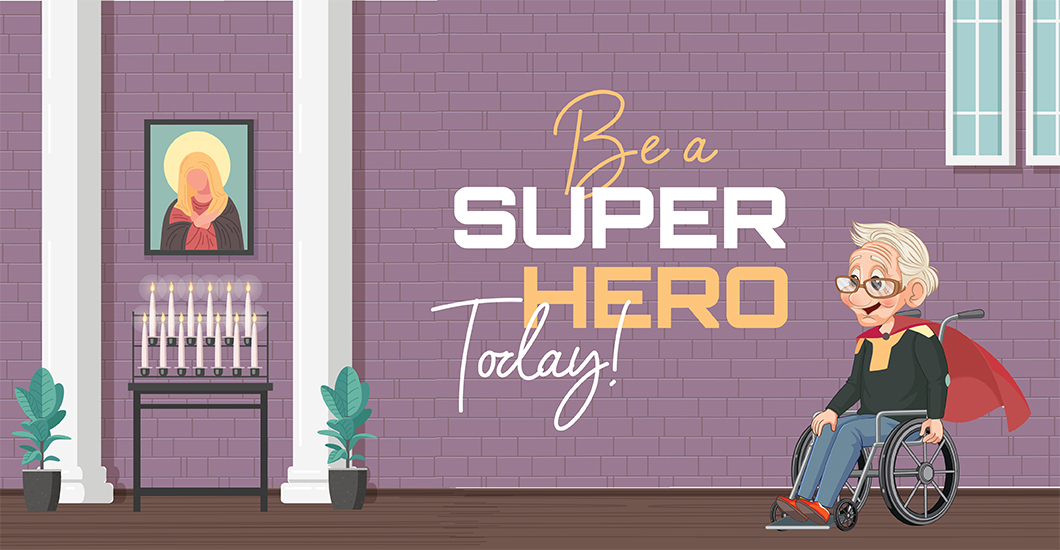
As a little girl, I wanted to become a Superhero but eventually I accepted that it was a child’s silly dream, until…
When I was a kid, I woke up early on Saturday mornings to watch Super-friends, a cartoon about a group of superheroes who saved the world. I wanted to be a superhero when I grew up. I would imagine getting a signal that someone needed help and quickly flying to their aid. All the superheroes I saw on TV remained incognito. To the world, they seemed like regular folks with boring lives. However, in times of trouble, they quickly mobilized and worked together to save humanity from the bad guys.
Once I grew up, I recognized that the superheroes in cartoons were imaginary characters. I gave up on my silly notions…until, one day, when I met a true superhero who opened my eyes. I would occasionally drop in to pray at the perpetual adoration chapel in a local church. Since someone has to be present at all times during Eucharistic adoration, volunteers sign up for short intervals. On many of my visits, I noticed an older man in a wheelchair who sat and prayed for hours at the chapel. He looked to be about 90 years old. Every so often, he would pull out different items from a bag—a Bible, a rosary, or a piece of paper that I assume was a prayer list. I wondered what kind of job he did when he was younger and physically healthy. Whatever he did before was probably not as significant as what he was doing now. I realized that this gentleman in a wheelchair was doing something far more important than most of us who were busy running around.
Incognito superheroes were hiding in plain sight! This meant I, too, could be a superhero…of prayer.
Responding to SOS
I decided to join the church prayer chain, a group of people who have committed to intercede for others privately. Many of these prayer warriors are elderly. Some are people with disabilities. Some are in seasons of life where they are homebound for various reasons. We get email notifications of names of people who have requested prayers. Just like the superheroes in the cartoons I watched long ago, we get a signal when someone needs help.
The prayer requests come in at all times of the day: Mr. X fell off a ladder and is being taken to the hospital. Mrs. Y has been diagnosed with cancer. A grandchild has been involved in a car crash. A man’s brother has been kidnapped in Nigeria. A family has lost their home in a tornado. The needs are many.
We take our responsibility as intercessors seriously. We stop whatever we are doing and pray. We are an army of prayer warriors. We are fighting invisible forces of darkness. Thus, we put on the full armor of God and fight with spiritual weapons. We pray on behalf of others who are in need. With perseverance and dedication, we continually submit our petitions to God.
The Hero Effect
Does prayer make a difference? Every so often, we get feedback from the people who have requested prayer. The kidnapped man in Nigeria was released within a week. Many experience miraculous healing. Most of all, people are strengthened and comforted during times of suffering. Jesus prayed, and He revolutionized the world! Prayer was part of His ministry of healing, deliverance, and providing for those in need. Jesus was in constant communication with the Father. He taught His disciples to pray as well.
Prayer allows us to understand God’s perspective and align our will to His Divine nature. And when we intercede for others, we become partners with Christ in His ministry of love. When we share our concerns with the omnipotent, omniscient, omnipresent God, there is a shift in the atmosphere. Our faithful prayer, united with God’s will, can move mountains.
“We beg you, Lord, to help and defend us. Deliver the oppressed. Pity the insignificant. Raise the fallen. Show yourself to the needy. Heal the sick. Bring back those of your people who have gone astray. Feed the hungry. Lift up the weak. Take off the prisoners’ chains. May every nation come to know that you alone are God, that Jesus is your Child, that we are your people, the sheep that you pasture. Amen.”
(Saint Clement)
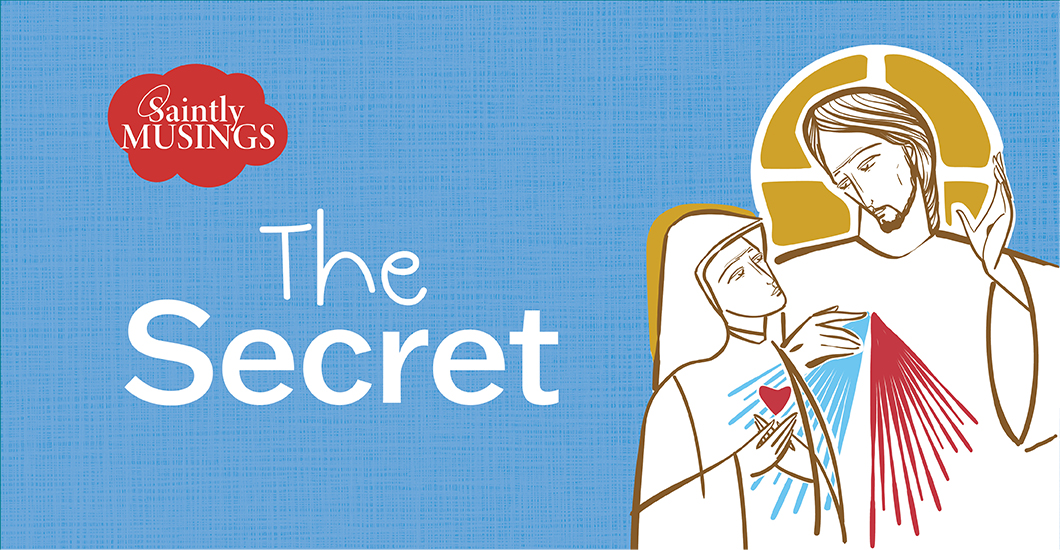
It was a stormy night. Sister Faustina bowed her face to the ground and prayed the Litany of the Saints. Toward the end of the Litany, such drowsiness overcame her that she couldn’t finish the prayer. She immediately got up and prayed, “Jesus, calm the storm, for Your child is unable to pray any longer, and I am heavy with sleep.” With these words, she threw the window open, not even securing it with hooks. Sister Fabiola said to her, “Sister, what are you doing!? The wind will surely tear the window loose!” But Sister Faustina asked her to sleep in peace. At once, the storm completely subsided. The next day, the sisters were talking about the sudden calming of the storm, not knowing what had really happened. And Sister Faustina thought to herself: “Only Jesus and Faustina know what it means…”
Such was the trust Saint Faustina had in Jesus. No wonder He appeared to her and gave her the mission of Divine Mercy for the whole world, with the instruction to inscribe the words: “JESUS I TRUST IN YOU.” She abandoned herself to Him completely, just like a child. Once, during Holy Mass, she had a miraculous vision. Jesus appeared as a one-year-old child and asked her to take Him in her arms. When she had taken Him in her arms, Infant Jesus cuddled up close to her bosom and said, “It is good for Me to be close to your heart…because I want to teach you spiritual childhood. I want you to be very little because when you are little, I carry you close to My Heart, just as you are holding Me close to your heart right now.”
Spiritual childhood is often misunderstood as naïveté or excessive sentimentality. However, it involves a total surrender to our heavenly Father’s providential care—total abandonment of our own plans, opinions, and self-will—and a radical trust in God. Can we, too, ask God to give us the grace to accept—like a little child—all that He asks of us in this life? As we do, can we trust, like Saint Faustina, that the Lord will not abandon us, even for a moment?
'
Q – Why did Jesus Christ have to die for us? It seems cruel that the Father would require the death of His only Son in order to save us. Wasn’t there some other way?
A – We know that Jesus’ death forgave us of our sins. But was it necessary, and how did it accomplish our salvation?
Consider this: if a student in school were to punch his classmate, the natural consequence would be a certain punishment—perhaps detention, or maybe being suspended. But if that same student were to punch a teacher, the punishment would be more severe—perhaps being expelled from the school. If that same student were to punch the President, they would likely end up in jail. Depending on the dignity of who is offended, the consequence would be greater.
What, then, would be the consequence of offending the all-holy, all-loving God? He Who created both you and the stars deserves nothing less than the worship and adoration of all Creation—when we offend Him, what is the natural consequence? Eternal death and destruction. Suffering and alienation from Him. Thus, we owed God a debt of death. But we could not repay it—because He is infinitely good, our transgression caused an infinite chasm between us and Him. We needed someone infinite and perfect but also human (since they would have to die to settle the debt).
Only Jesus Christ fit this description. Seeing us abandoned in an unpayable debt that would lead to eternal doom, out of His great love, He became man precisely so that He could pay back our debt on our behalf. The great theologian Saint Anselm wrote an entire treatise entitled, Cur Deus Homo? (Why did God become Man?), and concluded that God became man so that He could pay back the debt we owed but could not pay, so to reconcile us to God in a Person Who Himself is the perfect union of God and humanity.
Consider this too: if God is the source of all life, and sin means that we turn our back on God, then what are we choosing? Death. In fact, Saint Paul says that “the wages of sin are death” (Romans 6:23). And sin brings about the death of the whole person. We can see that lust can lead to STDs and broken hearts; we know that gluttony can lead to an unhealthy lifestyle, envy leads to dissatisfaction with the gifts God has given us, greed can cause us to overwork and self-indulge, and pride can rupture our relationships with one another and with God. Sin, then, is truly deadly!
It takes a death, then, to restore us to life. As an ancient Holy Saturday homily put it from the perspective of Jesus, “Look at the spittle on my face, in order to restore you to that first divine inbreathing at creation. See the blows on my cheeks, which I accepted in order to refashion your distorted form to my own image. See the scourging of my back, which I accepted in order to disperse the load of your sins which was laid upon your back. See my hands nailed to the tree for a good purpose, for you, who stretched out your hand to the tree for an evil one.”
Finally, I believe that His death was necessary to show us the depths of His love. If He had merely pricked His finger and shed a single drop of His Precious Blood (which would have been enough to save us), we would think that He didn’t love us all that much. But, as Saint Padre Pio said: “The proof of love is to suffer for the one you love.” When we behold the incredible sufferings that Jesus endured for us, we can never doubt for a moment that God loves us. God loves us so much that He would rather die than spend eternity without us.
In addition, His suffering gives us comfort and consolation in our suffering. There is no agony and pain that we can endure that He hasn’t already gone through. Are you in physical pain? So was He. Do you have a headache? His Head was crowned with thorns. Are you feeling lonely and abandoned? All of His friends left Him and denied Him. Do you feel ashamed? He was stripped naked for all to jeer. Do you struggle with anxiety and fears? He was so anxious that He sweat blood in the Garden. Have you been so hurt by others that you cannot forgive? He asked His Father to forgive the men driving nails into His hands. Do you feel like God has abandoned you? Jesus Himself cried out: “O God, my God, why have You abandoned Me?”
So we can never say: “God, you don’t know what I’m going through!” Because He can always respond: “Yes, I do, my beloved child. I’ve been there—and I am suffering with you right now.”
What a consolation to know that the Cross has brought God near to those who suffer, that it has shown us the depths of God’s infinite love for us and the great lengths He would go to rescue us, and that it has paid back the debt of our sins so that we can stand before Him, forgiven and redeemed!
'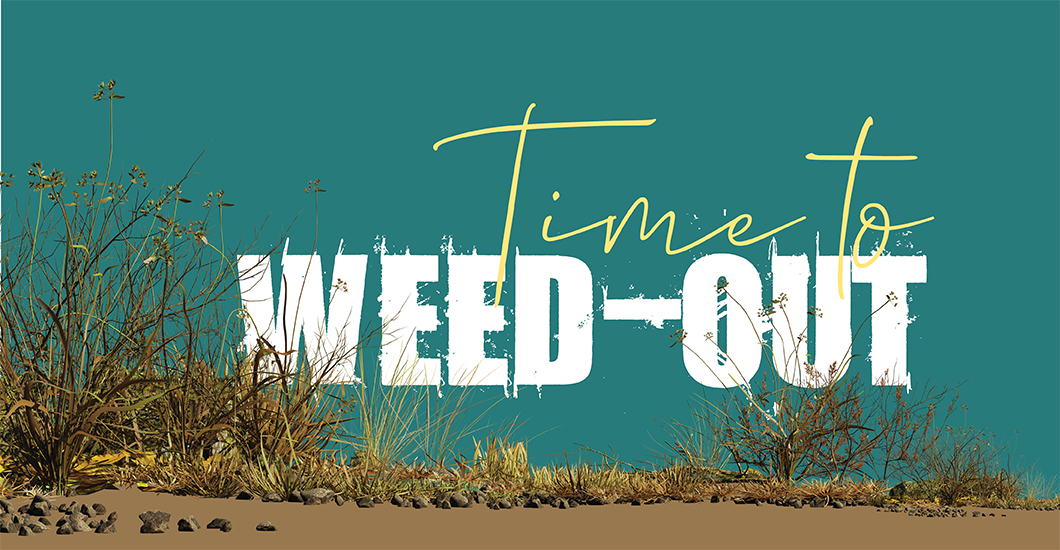
Weeding can be tedious, but it is a good exercise not just for your body but for your soul!
After many excuses to avoid cleaning up my backyard, I had to face the truth that it needed clearing badly. I was fortunate that my hubby was in a good mood to help, so together, we spent one day of our Christmas break uprooting the unwanted invaders.
Little did I know, there was a divine purpose to the exercise. As I started to break the hard yakka’s further growth with my left-over strength from the holiday gatherings, it filled me with so much joy, although it was not very fun at the start.
An Inevitable Confrontation
As I diligently hand-pulled and hoed the weeds, the workout led me to reflect on my spiritual health. How healthy have I been spiritually?
I experienced a life-changing encounter with Jesus, had my Baptism in the Spirit in 2000, and I have had many humbling privileges and opportunities to become a better person, through the leading of the Holy Spirit. There were many “ouch” moments of growth that challenged me to work harder, not so much in trying to perfect myself (for there is no such thing as perfection here on earth), but yes, getting closer in holiness in my walk with God was possible every day, as long as I tried. But have I really worked hard towards this goal? The pandemic had detracted me from my focus, as I got immersed instead in fear, anxiety, uncertainty, grief, and bereavement for friends and community who lost loved ones, jobs, property, and peace.
During my garden spruce up, I was confronted by weeds of various kinds. A weed is “a plant that causes economic losses or ecological damages, creates health problems for humans or animals, or is undesirable where it is growing.”
One by One
There was the Field Bindweed, a hardy perennial vine that has been given many names. Google says that, unfortunately, tilling and cultivation seem to aid Bindweed spread. The best control is early intervention. Seedlings must be removed before they become perennial. After that, buds are formed, and successful control gets more difficult.
Lord, what is in me that is like the Bindweed? Pride, lust, lies, offense, arrogance, or prejudice?
Then, there is the Quackgrass—a creeping and persistent perennial grass that reproduces by seeds. Its long, jointed, straw-colored rhizomes form a heavy mat in the soil, from which new shoots may also appear. We are advised to dig out this fast-growing grass as soon as we see it in our gardens, being sure to dig up the entirety of the plant (including the roots) and to dispose of it in our waste bin rather than the compost pile, as it will likely continue to grow in the latter!
Lord, what is my Quackgrass? Gossip, envy, malice, jealousy, materialism, or laziness?
This next weed I truly dislike. Canada thistle is an aggressive and creeping perennial weed from Eurasia. It infests crops, pastures, ditch banks, and the roadside. If it becomes rooted, experts say that the best control is to stress the plant and force it to use stored root nutrients. Yet, believe it or not, this weed is edible!
Lord, what is my Canada thistle? Which are the sins that I can turn to fruitful outputs? Stress, worry, anxiety, control, over-confidence, or self-sufficiency?
Nutsedges are perennial weeds that superficially resemble grasses, but they are thicker, stiffer, and V-shaped. The presence of Nutsedge often indicates that the soil drainage is poor or waterlogged. However, once established, it’s very difficult to control.
Lord, what is my Nutsedge, the habits that should warn me that it is time to prepare myself better? Lack of prayer, laziness to study Your Word, lukewarmness in sharing the Good News, lack of compassion and empathy, impatience, irritability, or lack of gratitude?
Then, there is the low-growing Buckhorn Plantain. With a long taproot, it can become drought-tolerant and is difficult to remove by hand. To remove this weed, pull up young plants and destroy them before the plants put out seeds. As a last resort, several herbicides are effective.
Lord, what is my Buckhorn Plantain, the ones that take root and refuse to leave the longer it stays? Addictive behaviors, selfishness, gluttony, vanity, getting into debt, or depressive and oppressive tendencies?
Ah, and this one—don’t we learn to love them!—Dandelions with their bright yellow heads in the springtime. They provide an important source of food for bees early in the year. But in time, they will also take over your garden. They have the weediest characteristics. Removing dandelions by hand-pulling or hoeing is often futile unless done repeatedly over a long period of time, because of their deep tap root system.
Lord, what is my Dandelion, the intertwining roots that bring up newer problems? Narcissism, over-spending time on social media, games, and videos, negative thinking, too many excuses, blame games, procrastinating, or people-pleasing?
Isn’t Pruning Painful?
In fact, “weeds” aren’t inherently bad. Many weeds stabilize the soil and add organic matter. Some are edible and provide habitat and food for wildlife. This has given me much hope indeed—that I can use and turn my weaknesses, bad habits, ingrained sinfulness, and limitations to good use by asking the Lord for help and healing, becoming fully dependent on Him to prune me and use me for His purpose. I know that change is hard, and some essential changes can only be made with God’s help.
If we sincerely seek God and ask the assistance of the Holy Spirit, the promised helper, God knows the struggles we face and encourages us to go to Him for the extra help we need (Matthew 7:7-8; Hebrews 4:15-16; 1 Peter 5:6-7). God doesn’t do all the work for us, but He does offer help to make us more effective.
Every day is an opportunity to start this process of regeneration, rejuvenation, and renewal. Let’s take it as both a challenge and rewarding time.
To put off your old self, which belongs to your former manner of life and is corrupt through deceitful desires, and to be renewed in the spirit of your minds, and to put on the new self (Ephesians 4:22-24).
'Are you afraid of death? I was too, until I heard of this PhD.
As a child, I always found it quite intimidating to attend funerals. I would become distressed as I imagined the deep sorrow encompassing the grieving family members. But with the pandemic, the news of neighbors, relatives, parishioners, and friends passing away led me to take a 180 degree change in the way I approach death. Death feels less scary these days. Now, it seems like a joyful return to the Father’s house after having done His will on earth.
A steady rise in the YouTube live streaming of funerals has somehow been a very edifying experience to me. It has helped me understand how uncertain life is. “Nothing is more certain than death, but nothing is more uncertain than the hour of death.” Therefore, we ought to be prepared as death will come as a thief in the night. Saint Gregory states that God, for our good, keeps the hour of our death hidden from us, so that we may ever be found prepared for death.
Recently, while reflecting on the last seven words of Jesus, I listened to a preacher speak about the importance of pursuing a “PhD,” which is nothing but “Preparation for a Happy Death.” When delving deeper into this, I came across a book written by Saint Alphonsus Ligouri titled Preparation for Death. It is a must-read for anyone striving to live a Christian life. It made me realize the fragility of life on earth and how we ought to strive to live for heaven. I would like to share a few important insights which changed my overall perspective about life and death.
All worldly glory in our lives will vanish away
At the hour of death, all the applause, amusements, and grandeur disappear like a mist. Worldly acclamations lose all their splendor when they are reviewed from one’s death-bed. We see nothing but smoke, dust, vanity, and misery. Therefore, let us refrain from chasing after worldly titles, so that we may gain the eternal crown. The time we have is too short to waste on worldly vanities.
The Saints always contemplated death
Saint Charles Borromeo kept a skull upon his table so that he could contemplate death. Blessed Juvenal Ancina had this motto written on a skull “What thou art I was once; what I am thou wilt be.” Venerable Caesar Baronius had the words, “Remember death!” upon his ring.
True meaning of ‘self-care’
Self-care isn’t about pampering ourselves with a variety of delicacies, clothing, amusements, and sensual enjoyments of the world! The true love for the body consists in treating it with rigor, in refusing it all pleasures which may lead to eternal unhappiness and misery.
Let us visit the cemetery often
We must go there not only to pray for the dead, but as Saint Chrysostom says: “We must go to the grave to contemplate dust, ashes, worms…and sigh.”
The corpse first turns yellow, and then black. Afterwards the body is covered with a white, disgusting mold. It then forms a sticky slime, which attracts worms that feed on the flesh. The worms, after having consumed all the flesh, devour one another. In the end, nothing remains but a fetid skeleton, which in the course of time falls to pieces. Behold what man is: he is a little dust on the threshing floor, which is blown away by the wind.
That ‘tomorrow’ to go for confession might never come
What if today is my last day on earth? If I commit a sin today and decide to reconcile with God tomorrow, what would become of me in eternity? How many poor, departed souls might have been through such regretful episodes? Once Saint Camillus de Lellis remarked, “If all these dead bodies could come back to life, what would they not do to gain eternal life?” You and I have the opportunity to make changes. What are we doing for our souls?
Our present life is a continual warfare with hell in which we are in constant danger of losing our souls. What if we are at the point of death now? Would we not ask God to grant us one more month or one more week in order to make our conscience clear in His sight? But God, in His great mercy, is giving us that time NOW. Let us be grateful to Him, try to atone for sins committed, and use every means to be found in a state of grace. When Sister Death arrives, there will be no time to atone for past sins, for she will come singing–“Make haste, it is now almost time to leave the world ; make haste, what is done, is done.”
'When thoughts of worthlessness creep in, try this…
He reeked. His filthy, starving body wasted away like his squandered inheritance. Shame engulfed him. He had lost everything—his wealth, his reputation, his family—his life was broken. Despair consumed him. Then, suddenly, his father’s gentle face flashed across his mind. Reconciliation seemed impossible, but in his desperation, he “set off and went to his father. But while he was still far off, his father saw him and was filled with compassion; he ran and put his arms around him and kissed him. Then the son said to him: ‘Father, I have sinned against Heaven and before you; I am no longer worthy to be called your son.’…But the father said…‘this son of mine was dead and is alive again; he was lost and is found!’ And they began to celebrate” (Luke 15:20-24).
Accepting God’s forgiveness is hard. Admitting our sins means admitting we need our Father. And as you and I wrestle with guilt and shame from past offenses, Satan the accuser assaults us with his lies: “You are unworthy of love and forgiveness.” But the Lord calls us to reject this lie!
At baptism, your identity as a child of God was stamped on your soul forever. And just like the prodigal son, you are called to discover your true identity and worthiness. God never stops loving you, no matter what you have done. “I will not reject anyone who comes to me” (John 6:37).
You and I are no exceptions! So, how can we take practical steps to accept God’s forgiveness? Seek the Lord, embrace His mercy, and be restored by His powerful grace.
Seek the Lord
Find your nearest church or adoration chapel and meet the Lord face to face. Ask God to help you see yourself through His merciful eyes with His unconditional Love.
Next, make an honest and courageous inventory of your soul. Be brave and look at Christ on the Crucifix as you reflect—bring yourself to the Lord. Admitting the reality of our sins is painful, but an authentic, vulnerable heart is ready to receive the fruits of forgiveness.
Remember, you are a child of God—the Lord will not turn you away!
Embrace God’s Mercy
Wrestling with guilt and shame can be like trying to hold a beach ball under the surface of water. It takes so much effort! On top of this, the devil often leads us to believe we are unworthy of God’s love and forgiveness. But from the Cross, Christ’s blood and water flowed from His side to cleanse, heal, and save us. You and I are called to radically trust in this Divine Mercy. Try saying: “I am a child of God. Jesus loves me. I am worthy of forgiveness.” Repeat this truth every day. Write it somewhere you see often. Ask the Lord to help you release yourself into His tender embrace of mercy. Let go of the beach ball and surrender it to Jesus—nothing is impossible for God!
Be Restored
In the Sacrament of Confession, we are restored by God’s graces of healing and strength. Fight against the devil’s lies and meet Christ in this powerful Sacrament. Tell the priest if you struggle with guilt or shame, and when you say your act of contrition, invite the Holy Spirit to inspire your heart. Choose to believe in God’s infinite mercy as you hear the words of absolution: “May God give you pardon and peace, and I absolve you of your sins in the name of the Father, and of the Son, and of the Holy Spirit.” You are now restored in the unconditional love and forgiveness of God!
Despite my failures, I ask God every day to help me accept His love and forgiveness. We may have fallen like the prodigal son, but you and I are still God’s sons and daughters, worthy of His endless love and compassion. God loves you, right here, right now—He gave up His life for you because of love. This is the transforming Hope of the Good News! So, embrace God’s forgiveness and dare to courageously accept His Divine Mercy. God’s inexhaustible compassion awaits you! “Fear not, for I have redeemed you; I have called you by name, you are mine” (Isaiah 43:1).
'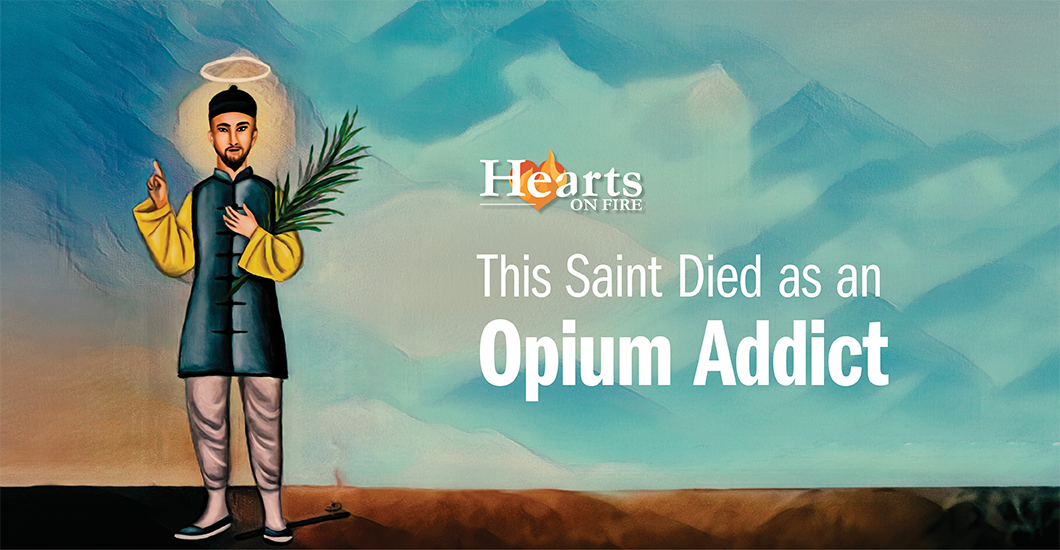
The Chinese Boxer Rebellion in the 1900s killed nearly 32,000 Chinese Christians and 200 Western Missionaries. Among these devoted Christians who gave their life for their faith, Saint Mark Ji Tianxiang stands out because, at the time of his death, he was an opium addict who had not received the Sacraments for 30 long years.
Ji was raised in a devout Christian family, and he was a respected and charitable doctor in his community. Fate be blamed, the opium he took to abate a disturbing stomach ailment took hold over him, and he was addicted to it in no time.
Though he went to frequent Confession, Ji found himself in the grips of a powerful addiction that refused to succumb to any means of resistance. His parish priest and confessor eventually told him that he could not continue to repeat the same sin in Confession anymore. Confession requires a conscious resolve to repent and sin no more, and this repeated sin, in the 19th century, was not understood as an illness. He was henceforth restricted from receiving the Sacraments, but he continued visiting the Church and stayed true to the Lord’s ways. He remained sincere to his faith because He believed in a Merciful Father.
Many assumed that he would be the first to deny the Lord when faced with the threat of persecution. But along with his son, grandchildren, and daughters-in-law, he persevered till the very end. In fact, Ji provided spiritual consolation to his fellow Christians as they were imprisoned and awaiting execution.
Stories record that as they were dragged to prison, his grandson, shaking with fear, asked him, “Grandpa, where are we going?” He calmly and jubilantly answered: “We’re going home.” He went to his death, singing the Litany of the Blessed Virgin Mary. Pope John Paul II canonized him in the year 2000.
'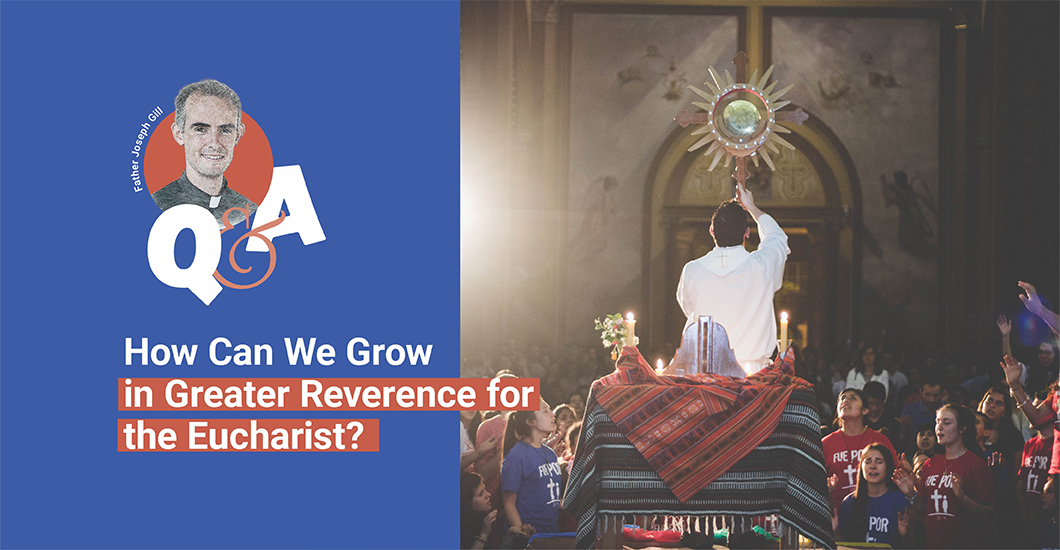
Q – The United States is in the midst of a three-year “Eucharistic Revival” campaign to try to inspire greater belief in Christ’s Real Presence. What are some practical ways that my family can practice greater reverence for the Eucharist?
A – A recent study said that only one-third of Catholics believe that Jesus Christ is truly present in the Holy Eucharist. In response, the Church is trying to reawaken what Saint John Paul II calls “Eucharistic amazement”—an awe and wonder in the Real Presence: Jesus, hidden yet truly present in the Eucharist.
How can we do this as a family? Here are some suggestions:
First, presence
If we knew that someone would be freely giving out a thousand dollars every week at a certain location, we would make sure to be there. Yet we receive something far more valuable—God Himself. The God Who created all the gold in the universe. The God Who loved you into existence. The God Who died to purchase your eternal salvation. The God Who alone can make us happy in eternal life.
The first step to a Eucharistic life is to make whatever sacrifices necessary to get to Mass at least weekly (or more often, if necessary). My father would often go to great lengths to take me and my brothers to Mass after a Scout camp-out. My brother could not try out for an elite baseball team because tryouts were on a Sunday morning. Wherever we went on vacation, my parents made sure to locate the closest Catholic Church. Considering how immensely valuable the Eucharist is, He is worth every sacrifice!
Second, purity
Making sure that our souls are clean from grave sin is a prerequisite to the Eucharistic banquet. No one would sit down at Thanksgiving dinner without washing their hands—neither should any Christian approach the Eucharist without being cleansed in Confession.
Third, passion
Throughout history, Catholics have risked their lives to attend Mass. Even today, there are at least 12 countries in the world where there are significant restrictions on Catholics, such as China, North Korea, and Iran. And yet Catholics are still willing to attend, despite the challenges. Do we have that same hunger for Him? Stir it up in your heart! Realize that we are summoned to the throne room of the King; we receive a front-row seat to the Sacrifice of Calvary. We are indeed allowed to partake in the foretaste of Heaven at every Mass!
Fourth, prayer
Once we have received Him, we ought to spend significant time in prayer. The great evangelist of Rome, Saint Philip Neri, used to send two altar boys with lit candles to follow anyone who left Mass early—recognizing that the person was literally a living tabernacle after they had received Christ! Immediately after receiving Him, we have such a privileged time to share our heart with Him, since He substantially dwells only a few inches below our hearts, in our bodies!
But this prayer to Christ’s Eucharistic presence should last long after Mass is concluded, as well. There was once a saint who wanted to live a Eucharistic life, but could only get to Mass on Sundays. She dedicated Thursday, Friday, and Saturday to a spiritual preparation for Holy Communion. Then on Sunday, she rejoiced that she could receive Him—and spent Monday, Tuesday, and Wednesday in thanksgiving for having received Him! So we ought to spend time in prayer throughout the week to thank God for the Eucharist we have received and to prepare our hearts for receiving this gift again!
Fifth, praise
A Eucharistic life continues with Eucharistic Adoration, which continues the worship of our Eucharistic Lord. Go to Adoration as often as you can. As Blessed Carlo Acutis said, “When we face the sun, we become tan, but when we place ourselves in front of the Eucharistic Jesus, we become saints.” He knew that it was God alone who made us holy, and by being in His presence, He would do the work!
I can testify to this. My parish started Perpetual Adoration (24 hours a day, seven days a week) when I was a teen, and I began to spend an hour in weekly Adoration. It was there that I realized how much the Lord loved me and that I was being called to give my life to Him as a priest. It was a huge part of my own conversion. In fact, my home parish had been in existence for more than 160 years without a single religious vocation from a young parishioner. After only 20 years of Adoration, our parish has produced over 12 religious vocations!
Blessed Carlo Acutis reminds us again, “The Eucharist is my highway to Heaven.”
We do not need to look far to wonder where God dwells and how to find Him—He dwells in every Tabernacle in every Catholic Church in the world!
'